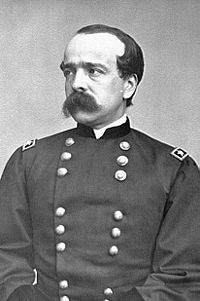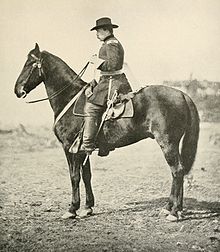- Daniel Butterfield
-
Daniel Adams Butterfield 
Daniel ButterfieldBorn October 31, 1831
Utica, New YorkDied July 17, 1901 (aged 69)
Cold Spring, New YorkPlace of burial West Point Cemetery
United States Military Academy
West Point, New YorkAllegiance United States of America
UnionService/branch United States Army
Union ArmyYears of service 1861–70 Rank  Major General
Major GeneralCommands held V Corps Battles/wars Awards Medal of Honor Other work Composer of "Taps"
Assistant U.S. TreasurerDaniel Adams Butterfield (October 31, 1831 – July 17, 1901) was a New York businessman, a Union General in the American Civil War, and Assistant U.S. Treasurer in New York. He is credited with composing the bugle call Taps and was involved in the Black Friday gold scandal in the Grant administration. He received the Medal of Honor for his service during the Civil War.
Contents
Early life
Butterfield was born in Utica, New York. He graduated in 1849 from Union College in Schenectady, New York, where he became a member of the Sigma Phi Society and was employed in various businesses in New York and the South, including the American Express Company, which had been co-founded by his father, John Warren Butterfield, an owner of the Overland Mail Company, stage-coaches, steamships, and telegraph lines.
Civil War
Only days after Fort Sumter, despite having little military background beyond part-time militia activities, he joined the Army as a first sergeant in Washington, D.C., on April 16, 1861. Within two weeks he obtained a commission as a colonel in the 12th New York Militia, which became the 12th New York Infantry. By July he commanded a brigade and by September he was a brigadier general.
Butterfield joined Maj. Gen. George B. McClellan's Army of the Potomac for the Peninsula Campaign in the V Corps, commanded by Maj. Gen. Fitz John Porter. In the Seven Days Battles, at Gaines' Mill on June 27, 1862, he was wounded, but also demonstrated bravery that eventually was recognized (in 1892) with the Medal of Honor. The medal citation read: "Seized the colors of the 83rd Pennsylvania Volunteers at a critical moment and, under a galling fire of the enemy, encouraged the depleted ranks to renewed exertion."
While the Union Army recuperated at Harrison's Landing, Virginia, from its grueling withdrawal during the Seven Days, Butterfield experimented with bugle calls and is credited with the composition of "Taps", probably the most famous bugle call ever written. He wrote "Taps" to replace the customary firing of three rifle volleys at the end of burials during battle. "Taps" also replaced Tattoo, the French bugle call to signal "lights out". Butterfield's bugler, Oliver W. Norton of the 83rd Pennsylvania Volunteers was the first to sound the new call. Within months, "Taps" was sounded by buglers in both the Union and Confederate armies. (This account has been disputed by some military and musical historians, who maintain that Butterfield merely revised an earlier call known as the Scott Tattoo and did not compose an original work. See External links section.)
Butterfield continued in brigade command at the Second Battle of Bull Run and the Battle of Antietam, became division commander, and then V Corps commander for the Battle of Fredericksburg. His corps was one of those assaulting through the city and up against murderous fire from Marye's Heights. After the debacles of Fredericksburg and the Mud March, Maj. Gen. Joseph Hooker replaced Ambrose Burnside as Army of the Potomac commander and Butterfield became his chief of staff in January 1863. He was promoted to major general in March 1863 with a date of rank of November 29, 1862.[1]
Hooker and Butterfield developed a close personal, and political, relationship. To the disgust of many army generals, their headquarters were frequented by women and liquor, being described as a combination of a "bar and brothel". Political infighting became rampant in the high command and Butterfield was widely disliked by most of his colleagues. However, the two officers managed to turn around the poor morale of the army and greatly improved food, shelter, and medical support in the spring of 1863. During this period, Butterfield introduced another custom that remains in the Army today: the use of distinctive hat or shoulder patches to denote the unit a soldier belongs to, in this case the corps. He was inspired by the division patches used earlier by Maj. Gen. Philip Kearny, but extended those to the full army and designed most of the patches himself.
Hooker was replaced after the Battle of Chancellorsville by Maj. Gen. George G. Meade, just before the Battle of Gettysburg. Meade distrusted Butterfield, but elected to retain him as chief of staff. Butterfield was wounded by a spent artillery shell fragment at Gettysburg on July 3, 1863, and left to convalesce. Meade removed him as chief of staff on July 14, 1863.[2]
After Gettysburg, Butterfield actively undermined Meade, in cooperation with Maj. Gen. Daniel Sickles, another crony of Hooker's. Although the battle was a great Union victory, Sickles and Butterfield testified to the Joint Committee on the Conduct of the War that Meade vacillated and planned as early as July 1 to retreat from Gettysburg, damaging his reputation. Butterfield's chief evidence for this assertion was the Pipe Creek Circular that Meade had his staff prepare before it became apparent that there would be a battle at Gettysburg.[3]
Butterfield returned to duty that fall as chief of staff once again for Hooker, now commanding two corps in the Army of the Cumberland at Chattanooga, Tennessee. When these two depleted corps (the XI and XII Corps) were combined to form the XX Corps, Butterfield was given the 3rd Division, which he led through the first half of Sherman's Atlanta Campaign. Illness prevented his completion of the war in the field, and he assumed quiet duties at Vicksburg, Mississippi, followed by recruiting and the command of harbor forces in New York.
Postbellum life
After the war, President Ulysses S. Grant appointed Butterfield Assistant Treasurer of the United States, based on a recommendation by Abel Corbin, Grant's brother-in-law. Butterfield agreed to tell Corbin and speculators Jay Gould and James Fisk when the government was planning to sell gold, a market that Fisk and Gould wanted to corner. Butterfield accepted a $10,000 payment from Gould, which Gould said was "to cover expenses". Butterfield later testified to Congress that it was an unsecured real estate loan.[4] If Butterfield tipped them off, Fisk and Gould would sell their gold before the price dropped. The scheme was uncovered by Grant, who sold $4,000,000 of government gold without telling Butterfield. This resulted in the panic of collapsing gold prices known as Black Friday, on September 24, 1869. On September 21, 1886, he married Mrs. Julia L. James of New York in a ceremony in London.
Butterfield died in Cold Spring, New York, and was buried with an ornate monument in West Point Cemetery at the United States Military Academy, although he had not attended that institution. Taps was sounded at his funeral. He was the author of the 1862 Army field manual, Camp and Outpost Duty for Infantry.
Medal of Honor citation
Rank and organization: Brigadier General, U.S. Volunteers. Place and date: At Gaines Mill, Va., June 27, 1862. Entered service at: Washington, D.C. Born: October 31, 1831, Utica, N.Y. Date of issue: September 26, 1892.
Citation:
Seized the colors of the 83d Pennsylvania Volunteers at a critical moment and, under a galling fire of the enemy, encouraged the depleted ranks to renewed exertion.In memoriam
The Butterfield Paramedic Institute in Cold Spring, New York, which was once a hospital, is named for him. He has also been memorialized in the novel The Killer Angels by Michael Shaara—a character in the 20th Maine claims that their brigade bugle call was written by Butterfield and is based on his own name, sounding to the rhythm of "Dan, Dan, Dan, Butterfield, Butterfield".
There is a statue of the general by Gutzon Borglum in Sakura Park in Manhattan.
See also
- List of Medal of Honor recipients
- List of American Civil War Medal of Honor recipients: A–F
- List of American Civil War generals
Notes
References
- Eicher, John H., and David J. Eicher. Civil War High Commands. Stanford, CA: Stanford University Press, 2001. ISBN 0-8047-3641-3.
- Hyde, Bill. The Union Generals Speak: The Meade Hearings on the Battle of Gettysburg. Baton Rouge: Louisiana State University Press, 2003. ISBN 978-0-8071-2581-6.
- Smith, Jean Edward. Grant. New York: Simon & Shuster, 2001. ISBN 0-684-84927-5.
External links
- "Account of Taps that disputes Butterfield's composition". http://www.jvmusic.net/historyoftaps.html. Retrieved September 27, 2010.
- "Web biography of Butterfield". http://www.civilwarhome.com/butterfieldbio.htm. Retrieved September 27, 2010.
Military offices Preceded by
Joseph HookerCommander of the V Corps
November 16, 1862 – December 25, 1862Succeeded by
George MeadeCategories:- 1831 births
- 1901 deaths
- People from Utica, New York
- Army Medal of Honor recipients
- American military personnel of the Mexican–American War
- Union College (New York) alumni
- Union Army generals
- United States Army generals
- People of New York in the American Civil War
- New York Republicans
- Burials at West Point Cemetery
Wikimedia Foundation. 2010.

